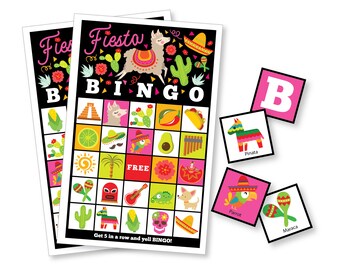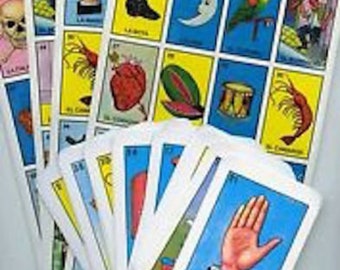Mexican Bingo
Print 2 pages of Mexican Culture Bingo Cards for free. Download a PDF with 2 free pages of bingo cards plus instructions and a randomized call sheet. Customize the events, add your own free space, change the BINGO header, or add a fun checkerboard, etc.

Using a browser, play with 2 pages of Mexican Culture for free. You host a game and invite a guest via a link. If you enjoy the game, purchase more randomly generated pages below and invite all of your family, friends, coworkers!


Mexican loteria is a wonderful, traditional card game similar to bingo. (Make the image appear on white background). Sep 18, 2016 Loteria, known to many as Mexican Bingo, is a traditional card game that has been passed down many generations. Although the game originated in Italy, it was brought into the Mexican culture via Spain. “Loteria” is the Spanish word for lottery. As the crew plays the traditional game of Loteria! Who do you guys got?Edited by Brandon Choi: http://instagram.com/bchoiiCas. For a truly authentic Fiesta or Cinco de Mayo party game, we suggest our classic Loteria Mexican Bingo. This game is played like regular bingo, except you cover up the spaces on your playing card based on the traditional Mexican images drawn from a deck of cards. This game is sure to be a big hit! 10 playing cards per set. Download Mexican Bingo for Android to gather your family and friends to play the traditional Mexican Bingo, ask everyone to install our app, we help some of them to save the cards.
Purchased packs are electronically delivered and contain either 10, 25, 50 or 100 randomly generated bingo cards of the 2 page free sample on this page. You may print these packs over and over again forever.

Host Instructions:
- Decide when to start and select your goal(s)
- Designate a judge to announce events randomly or as they happen
- Cross off events from the list when announced
- First to get any line (up, down, left, right, diagonally)
- First to get the four corners
- First to get two diagonal lines through the middle (an 'X')
- First to get all squares
- Check off events on your card as they occur
- If you complete a goal, shout 'Bingo!'. You've won!
- The judge decides in the case of disputes
| B | I | N | G | O |
| Nachos | guitar | fajitas | guacamole | folk art |
| bullfighting | tacos | red | marimba | menudo |
| Mariachis | sombrero | FREE | La Cucaracha | conquest |
| Noche Buena | Dia de los Muertos | white | Pinatas | freedom |
| chiles | Navidad | jalepenos | fiesta | quesidillas |
Host Instructions:
- Decide when to start and select your goal(s)
- Designate a judge to announce events randomly or as they happen
- Cross off events from the list when announced
- First to get any line (up, down, left, right, diagonally)
- First to get the four corners
- First to get two diagonal lines through the middle (an 'X')
- First to get all squares
- Check off events on your card as they occur
- If you complete a goal, shout 'Bingo!'. You've won!
- The judge decides in the case of disputes
| B | I | N | G | O |
| salsa | Estados Unidos Mexicanos | Dia de los Muertos | La Cucaracha | white |
| guitar | guacamole | Pinatas | red | arroz con pollo |
| menudo | tortilla | FREE | sombrero | freedom |
| tacos | corn | chiles | frijoles | fajitas |
| folk art | Mexican Hat Dance | enchillidas | quesidillas | Navidad |
Mexican Bingo Game
This bingo card was created randomly from a total of 36 events :
:Mexican Bingo Svg
Host Instructions:
- Decide when to start and select your goal(s)
- Designate a judge to announce events randomly or as they happen
- Cross off events from the list when announced
- First to get any line (up, down, left, right, diagonally)
- First to get the four corners
- First to get two diagonal lines through the middle (an 'X')
- First to get all squares
- Check off events on your card as they occur
- If you complete a goal, shout 'Bingo!'. You've won!
- The judge decides in the case of disputes
Loteria, known to many as Mexican Bingo, is a traditional card game that has been passed down many generations. Although the game originated in Italy, it was brought into the Mexican culture via Spain.
“Loteria” is the Spanish word for lottery. While it is a game of chance, the rules of the game are more similar to bingo and it consists of a set of 54 cards.
Each card has a different picture, and its corresponding name in Spanish underneath. Each player then chooses a board with randomly selected images across it, like bingo cards. Players mark their free spots to begin the game.
The game can be played many ways. The way each person was taught how to play largely depends on the area they grew up in or where their family is from. One way to play is having one person be the role of el cantor, or the caller, who is responsible for calling out a riddle that goes with the picture.
For example, if the caller picked “la mano,” a corresponding riddle would be “la mano de un criminal.” This way of playing is typical of Oaxaca, Mexico. Another way of playing would simply be calling out “la mano” and holding up the card for all the players to see. The players then mark the spot with either corks, bottle caps, small rocks or pinto beans.
The first player with four chips in a horizontal, vertical, diagonal or, in some games, squared pattern wins the game after shouting “Loteria!” Card decks can now be bought in most Mexican markets.
For this reason, it’s also a tool that has been used for educational purposes. It has been used to teach reading, writing and proper social values. This simple card game is used in several high school classroom settings to give the students a way to practice speaking, writing and connecting words to images.
The most famous version of the cards uses the artwork titled “Don Clemente Gallo,” which was introduced in Mexico by French businessman Don Clemente Jacques.
The images on the cards have been an iconic tie to the Mexican culture over the years; They instill a sense of pride and tradition.
Because it became such an iconic style of artwork, the tablas remained unchanged for over 100 years after the original artwork came out.
Since then, artists have created dedication versions of the game in honor of the original artwork and the significance it plays within Mexican culture.